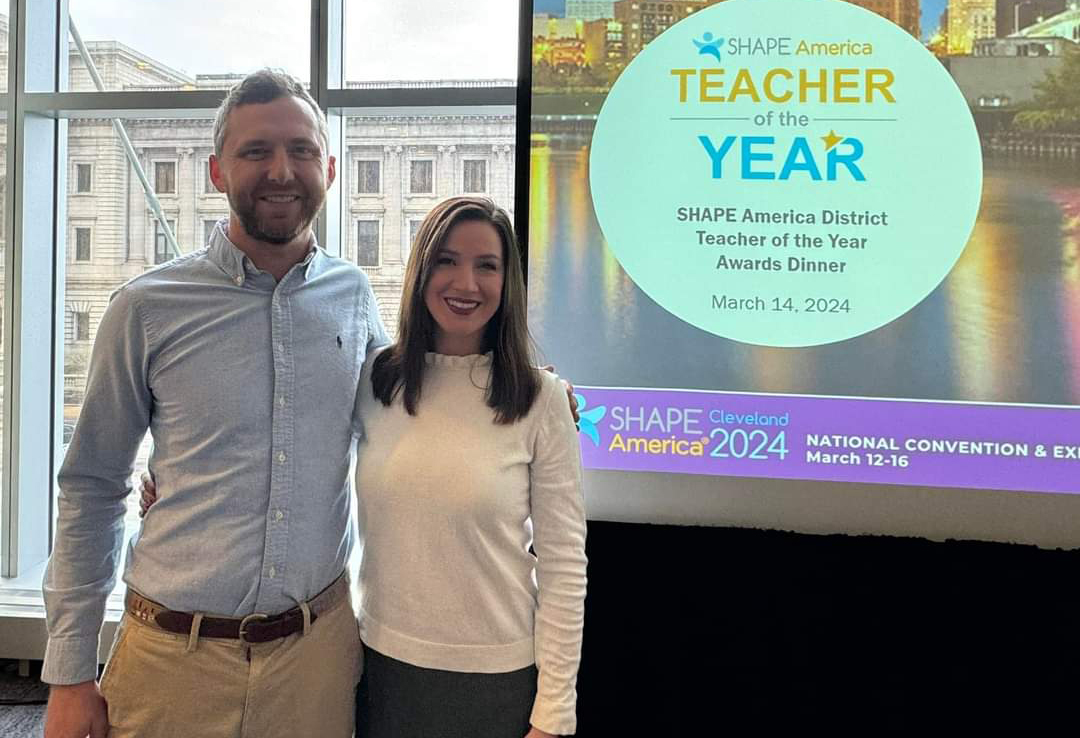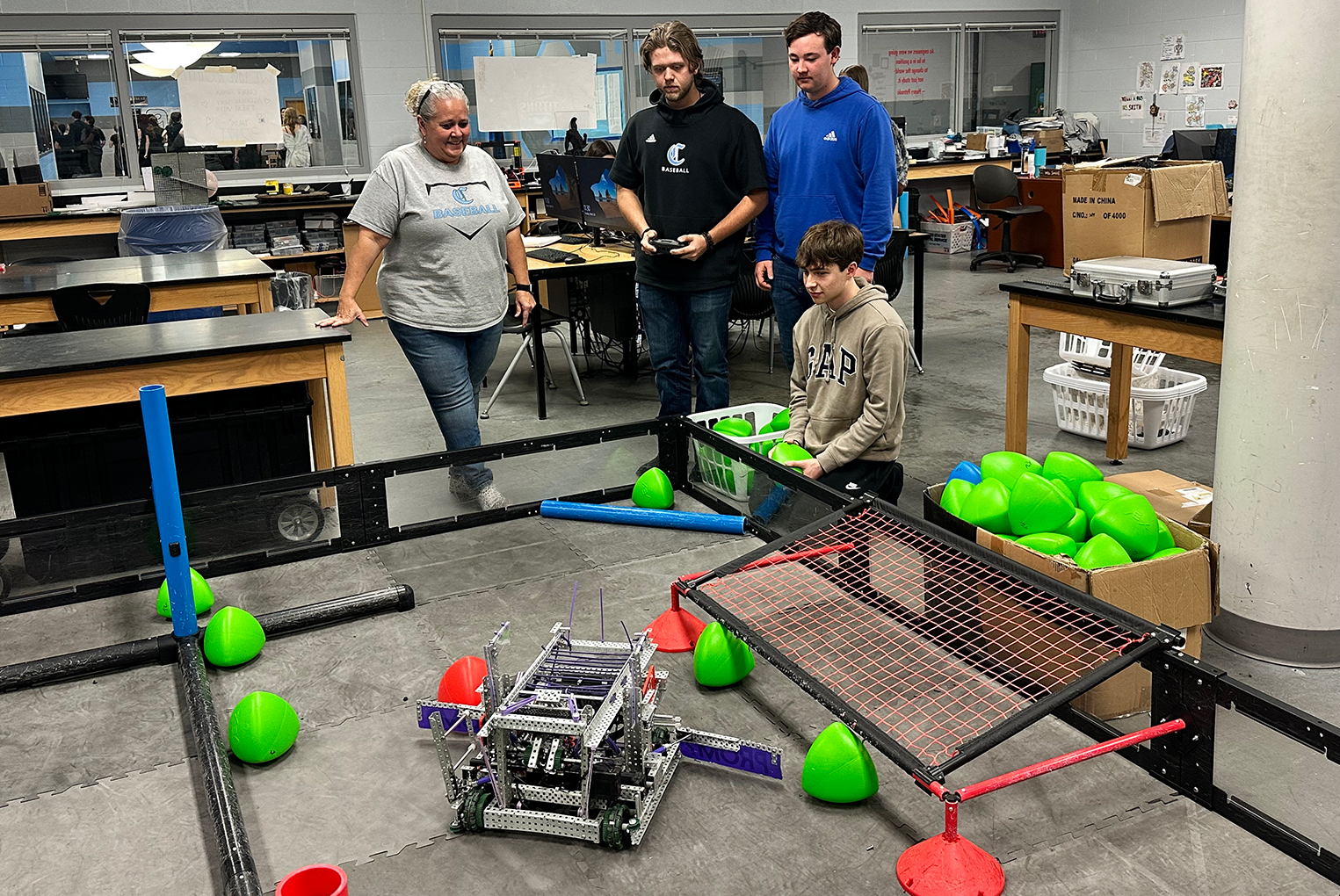matthew.tungate@education.ky.gov

Ruth Ann Driggers teaches Spanish classes through the JCPS eSchool. Driggers has been with the program since its beginning in 2000. “I found it a really great opportunity after 31 years in the classroom. I can use that content knowledge to help students online,” she said. Also pictured is English teacher Erik Nicholson.
The school bell rings and a student looks up from her smartphone, where she’s been chatting via Facebook with a boy from Brazil. They are working collaboratively on a project about each other’s home country.
The teacher, skyping from a neighboring district, in Portuguese tells the girl and her classmates to take the first 15 minutes of class to use their smartphones or iPads to answer the question posted on the interactive white board. Many students start by looking in their e-textbook, which their teacher compiled before the semester started. Others simply go to Google.
Once the 15 minutes are over, the teacher directs the students to a website where they have to use what they have learned to help an Indiana Jones-like explorer complete missions. It’s more like a video game than a quiz, but the teacher can tell by how they do who did the work and who didn’t. She’ll send those who didn’t do well an e-mail with links to the information after school, along with an assignment for them to turn in – electronically, of course – the next day.
This and similar scenes will be typical in Kentucky schools if David Cook at the Kentucky Department of Education and other drafters of a recent report can bring their vision to fruition.
“You combine various things to create an environment to engage the student at a greater level. So it may be a traditional classroom, but that teacher has incorporated technology of various kinds – digital gaming, online learning through a traditional method, using social media so that students can interact with students in other countries – all of that put together is what digital learning conceptually is today,” said Cook, KDE’s director of the Division of Innovation and Partner Engagement. “It’s best when it is a blending of several different kinds of delivery methods.”
Last December, Cook and Tom Vander Ark, CEO of Open Education Solutions, presented a report called Digital Learning 2020. The report addressed a recommendation of Breaking New Ground, the final report of the Governor’s Task Force on Transforming Education in Kentucky, to make better use of technology to improve teaching and learning and “to enhance and expand virtual and blended learning, including funding options to ensure equitable access to students across the Commonwealth.” A two-month planning process involving surveys, interviews and focus groups resulted in the findings and recommendations in five categories.
“The next five years are really going to be an extraordinary period of time. Most kids in the United States are, five years from now, going to be learning in environments that are going to blend online and on-site in new and interesting ways. Most of the assessments that you give will be online assessments. Kids and teachers are going to do a lot of their learning online,” Vander Ark, a former public school superintendent who chairs the International Association for K-12 Online Learning, told the board.
The report makes recommendations in five areas:
- access to digital learning
- personalization and advancement
- curriculum and instruction
- assessment and accountability
- funding and infrastructure
Among the recommendations was for the Department of Education to move away from being an online provider of virtual classes through the Kentucky Virtual High School (KVHS) and to expand opportunities through other outlets, including the Barren Academy of Virtual and Expanded Learning (BAVEL) and Jefferson County Public Schools eSchool.
Vander Ark told the board that while Kentucky was an early leader in providing virtual options for students, times have changed.
“What’s happened in the subsequent 15 years is that there are a large number of very good providers, and that includes a number of school districts here in Kentucky that are already working at scale providing services for kids statewide,” he said.
Last month, KDE officials announced this would be the last semester for KVHS. Instead, the department will provide a comprehensive list of digital learning providers, support and guidance to schools and districts to make the best choices regarding the use of digital content and online courses.
Cook said it is time to move beyond what KVHS offered: a structure that took existing course content and created a virtual version.
“Virtual learning is ‘digital learning 1.0,’ and we’re at probably 2.5 at this point,” he said. “It was the first generation of how do you provide content to kids who can’t access it face-to-face with somebody.”
The next generation includes JCPS eSchool, according to the report. Assistant Principal Artie Dietz said eSchool could handle an influx of new students in dual-credit and core curriculum/electives.
“It’s exciting for us,” said Dietz, who was part of a work session that provided information for the Digital Learning 2020 report.
However, eSchool has not offered Advanced Placement courses on a full scale, which has been one of the core roles of KVHS, he said. Other organizations will have to fill that role, Dietz said.
Ruth Ann Driggers, a Spanish resource teacher in her 42nd year teaching, was the first eSchool teacher in 2000.
Negativity surrounded the start of the school, she said, because many in the district were concerned that online courses would replace face-to-face teachers and brick-and mortar-schools.
“And that’s not true. It’s just another facet of the educational program,” she said. “It’s not there to replace the regular teacher. We’re always going to need the regular teacher in the brick-and-mortar school.”
Now eSchool, which functions as part of Jefferson County High School, the district’s high school for at-risk students, has middle and high school students in 12 states.
Dietz said eSchool began and remains at its heart a program for credit recovery. But as teachers build their courses to that end, “it’s a full course. You’re covering everything. These are comprehensive courses,” he said.
They also are rigorous, Dietz said.
“When that student completes this course, he or she is going to master an understanding of all concepts that any other student in the state of Kentucky should have,” he said.
Erik Nicholson, high school freshman and senior English teacher, said there is a lot of misunderstanding even in the teaching community about digital learning.
“It provides needed flexibility that traditional schools have not always provided,” he said.
Dietz agreed.
“Online education is this huge concept,” he said. “The days of students coming into a lab setting and doing 20 modules in three days and receiving a half credit in senior English should be over.”
Cook said the report is just a starting place to begin discussions about how education can move forward in the digital age. Teachers will see their jobs change, he said.
“We know that we now have every bit of knowledge on the internet. So to think about a classroom being a place where an adult walks in to tell kids about something, and those kids learn it, that’s not really what we need anymore. Because the kid, if you tell them what they need to learn, most kids can probably go find what they need to learn,” he said. “What that teacher has to become is that person who helps them learn how to use the information correctly.”
Teachers have to think like the digital natives their students are, Cook said.
“Teachers need to embrace this as an exciting new way to make their teaching more enjoyable to them as well as being more enjoyable to the kids,” he said. “I would bet the world that if I asked teachers what’s one of things that’s most important to them, it’s to see their kids engaged. And if I’m going to be able to give them things though digital learning that’s going to give them more engagement, my job’s not only going to become easier, it’s going to become more fulfilling.”
MORE INFO…
Digital Learning 2020
JCPS eSchool
David Cook, david.cook@education.ky.gov, (502) 564-4201









Leave A Comment